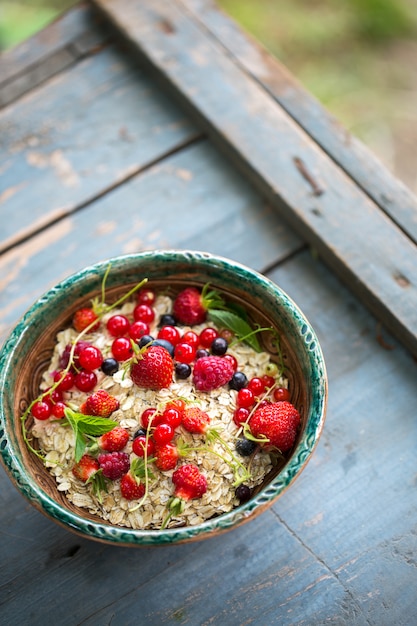7 High-Fiber Foods to Lower Cholesterol by 15% in 3 Months

The 7 best high-fiber foods to lower cholesterol by 15% in 3 months include oats, beans, apples, flax seeds, almonds, broccoli, and pears, all of which contribute to reducing LDL cholesterol levels and promoting a healthier heart.
Looking to naturally lower your cholesterol levels? Discover how incorporating specific high-fiber foods into your diet can significantly impact your heart health and help you achieve a 15% reduction in cholesterol in just three months. Read on to find out what are the 7 best high-fiber foods to lower cholesterol by 15% in 3 months!
Understanding Cholesterol and the Role of Fiber
Cholesterol is a fatty substance vital for building cells, but high levels, especially LDL cholesterol, can lead to heart disease. Diet plays a crucial role in managing these levels.
Dietary fiber is essential for a healthy digestive system, and it has a significant impact on cholesterol levels. Incorporating soluble fiber into your daily meals can help keep your heart healthy.
The Different Types of Cholesterol
It is important to understand the types of cholesterol that affect your health. Here are the main types:
- LDL Cholesterol: Often referred to as “bad” cholesterol, high levels can lead to plaque buildup in your arteries, increasing the risk of heart disease and stroke.
- HDL Cholesterol: Known as “good” cholesterol, it helps remove LDL cholesterol from your arteries. Higher levels of HDL are associated with a lower risk of heart problems.
- Triglycerides: Another type of fat in your blood. High levels, especially when combined with high LDL or low HDL, can increase your risk of heart disease.
How Fiber Helps Lower Cholesterol
Soluble fiber is especially effective in lowering cholesterol. It works by binding to cholesterol in the digestive system, preventing it from being absorbed into the bloodstream. This process helps reduce LDL cholesterol levels.
Insoluble fiber, while not directly lowering cholesterol, promotes overall digestive health, which indirectly supports heart health. A healthy digestive system ensures efficient waste removal, contributing to better cholesterol management.

Including a variety of fiber-rich foods in your diet can help you achieve a significant reduction in cholesterol levels. Let’s explore the top 7 high-fiber foods that can help lower your cholesterol by 15% in just 3 months.
Oats: The Heart-Healthy Breakfast Staple
Oats are a breakfast staple known for their heart-healthy benefits. They are packed with soluble fiber, making them an excellent choice for lowering cholesterol.
Starting your day with a bowl of oatmeal can significantly contribute to reducing LDL cholesterol levels. Regular consumption of oats has been linked to improved heart health and reduced risks of heart disease.
Benefits of Soluble Fiber in Oats
The soluble fiber in oats, called beta-glucan, forms a gel-like substance in the digestive system. This substance binds to cholesterol, preventing its absorption.
Beta-glucan effectively reduces LDL cholesterol by promoting its excretion from the body. This process helps maintain healthy cholesterol levels and reduces the risk of arterial plaque buildup.
- Choose the right type: Opt for steel-cut or rolled oats over instant varieties for maximum fiber content.
- Add healthy toppings: Enhance your oatmeal with fruits, nuts, and seeds for added nutrients and flavor.
- Be mindful of added sugars: Avoid sugary toppings or pre-sweetened oatmeal to maintain its health benefits.
Beans: A Versatile Cholesterol-Lowering Powerhouse
Beans are a versatile and nutritious food that can significantly impact your cholesterol levels. Packed with fiber, they offer a convenient and effective way to lower LDL cholesterol.
Incorporating beans into your meals can contribute to a substantial reduction in cholesterol levels. Their high fiber content promotes heart health and reduces the risk of cardiovascular diseases.

Different Types of Beans and Their Benefits
There are various types of beans, each offering unique nutritional benefits. Common types include:
- Kidney Beans: Rich in both soluble and insoluble fiber, kidney beans are excellent for lowering cholesterol and promoting digestive health.
- Black Beans: A great source of antioxidants and fiber, black beans support heart health and help manage cholesterol levels.
- Lentils: A versatile legume that is high in protein and fiber, lentils offer a delicious and effective way to reduce cholesterol.
Including a mix of different beans in your diet ensures a broad range of nutrients and maximum cholesterol-lowering benefits.
Beans provide a high fiber content, which helps bind to cholesterol in the digestive system, preventing its absorption into the bloodstream. This process effectively lowers LDL cholesterol levels.
Apples: The Delicious Way to Lower Cholesterol
Apples are not only delicious but also a great way to lower cholesterol naturally. They contain pectin, a type of soluble fiber known for its cholesterol-lowering properties.
Enjoying an apple a day can contribute to a healthier heart by reducing LDL cholesterol levels. Regular consumption of apples supports overall cardiovascular health.
Pectin: The Fiber Superstar in Apples
Pectin is a soluble fiber found in high concentrations in apples. It works by binding to cholesterol in the digestive system, blocking its absorption and promoting its removal from the body.
Pectin helps lower LDL cholesterol without affecting HDL cholesterol, making apples an excellent choice for maintaining a healthy cholesterol balance.
Choose a wide variety of apples for both taste and nutritional benefits. Red, green, and yellow apples each offer unique nutrients and antioxidants.
Flax Seeds: Tiny Seeds with a Big Impact
Flax seeds are small but mighty seeds that pack a powerful punch when it comes to lowering cholesterol. They are rich in soluble fiber and omega-3 fatty acids, both beneficial for heart health.
Adding flax seeds to your diet can help reduce LDL cholesterol levels and improve overall cardiovascular health. Their dual benefits make them a valuable addition to any cholesterol-lowering diet.
Omega-3 Fatty Acids and Fiber in Flax Seeds
Flax seeds contain alpha-linolenic acid (ALA), an omega-3 fatty acid that can help reduce inflammation and support heart health. The soluble fiber in flax seeds also aids in cholesterol management.
- Ground flax seeds: Opt for ground flax seeds for better absorption of nutrients, as whole flax seeds may pass through the digestive system undigested.
- Add to various dishes: Sprinkle ground flax seeds on yogurt, oatmeal, salads, or blend them into smoothies.
- Store properly: Keep flax seeds in an airtight container in the refrigerator to maintain their freshness and nutritional value.
Regular consumption of flax seeds ensures a consistent intake of both fiber and omega-3 fatty acids, contributing to improved cholesterol levels and heart health.
Almonds: A Nutty Way to Healthy Cholesterol Levels
Almonds are a delicious and nutritious snack that can help lower cholesterol. They contain healthy fats, fiber, and plant sterols, all of which contribute to improved cholesterol levels.
Enjoying a handful of almonds as part of your daily diet can help reduce LDL cholesterol and promote heart health. Their combination of nutrients makes them a smart choice for cholesterol management.
Healthy Fats and Fiber in Almonds
Almonds are rich in monounsaturated fats, which can help lower LDL cholesterol. Additionally, their fiber content aids in preventing cholesterol absorption.
Plant sterols in almonds can also help block the absorption of cholesterol in the digestive system, further contributing to lower cholesterol levels.
Choose unsalted almonds to avoid excess sodium. A small handful is sufficient to provide the necessary nutrients without adding extra calories.
Broccoli: Your Green Ally in Cholesterol Reduction
Broccoli is a cruciferous vegetable that offers a range of health benefits, including cholesterol reduction. It contains soluble fiber and compounds that support heart health.
Including broccoli in your meals can contribute to lowering LDL cholesterol levels and improving overall cardiovascular health. Its nutrient-rich profile makes it a beneficial addition to your diet.
The Role of Fiber and Compounds in Broccoli
Broccoli contains soluble fiber that binds to cholesterol in the digestive system, reducing its absorption. Additionally, compounds in broccoli support liver function, which is crucial for cholesterol metabolism.
Broccoli can be enjoyed in various ways, such as steamed, roasted, or added to soups and salads. Its versatility makes it easy to incorporate into your daily meals.
- Steaming: Steaming helps retain the most nutrients.
- Roasting: Roasting brings out a nutty flavor and retains fiber content.
- Adding to dishes: Mix broccoli into stir-fries, pastas, or salads for added nutrients.
Regular consumption of broccoli ensures a steady intake of essential nutrients and fiber, contributing to improved cholesterol levels and heart health.
Pears: A Sweet and Fiber-Rich Treat for Your Heart
Pears are a sweet and juicy fruit that can help lower cholesterol. They are a good source of pectin, the soluble fiber that assists in cholesterol management.
Adding pears to your diet can contribute to reduced LDL cholesterol levels and improved heart health. Their pleasant taste makes them an enjoyable way to boost your fiber intake.
Pears are rich in nutrients and fiber, making them a valuable addition to a heart-healthy diet.
How Pears Help Lower Cholesterol
Pears contain pectin, a soluble fiber that binds to cholesterol in the digestive system, preventing its absorption into the bloodstream. This process effectively lowers LDL cholesterol levels.
Enjoy pears as a snack, add them to salads, or bake them into desserts. Their versatility makes them easy to incorporate into your diet.
By including pears in your diet, you can enjoy a sweet treat while also improving your cholesterol levels and supporting heart health.
| Key Food | Brief Description |
|---|---|
| 🌾 Oats | Rich in beta-glucan, lowers LDL cholesterol by binding to it in the digestive system. |
| 🫘 Beans | High in soluble fiber, preventing cholesterol absorption. |
| 🍎 Apples | Contain pectin, a soluble fiber that lowers LDL cholesterol effectively. |
| 🌱 Flax Seeds | Rich in soluble fiber and omega-3 fatty acids, promoting heart health. |
Frequently Asked Questions
▼
Aim for at least 25-30 grams of fiber per day, focusing on soluble fiber from oats, beans, fruits, and vegetables. This amount can significantly help in reducing LDL cholesterol levels.
▼
Yes, a diet rich in soluble fiber from the listed foods, combined with regular physical activity, can often lower cholesterol by 15% in about 3 months. Consistent effort is key.
▼
Increasing fiber intake too quickly might cause gas, bloating, or discomfort. It’s best to gradually increase fiber intake and drink plenty of water to ease digestion discomfort.
▼
If diet and exercise alone aren’t sufficient, consult your doctor. Medication might be necessary to manage cholesterol to protect your heart health and support longevity.
▼
Yes, children can also benefit from a balanced, high-fiber diet. Make sure to tailor the fiber intake to their age and dietary needs, and always consult with a pediatrician.
Conclusion
Incorporating these 7 high-fiber foods into your diet can significantly improve your cholesterol levels and promote a healthier heart. A balanced diet rich in fiber, combined with regular exercise and lifestyle changes, can help you achieve a 15% reduction in cholesterol within 3 months.
